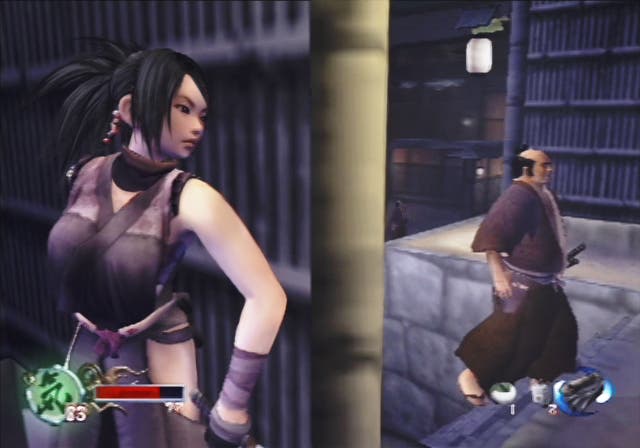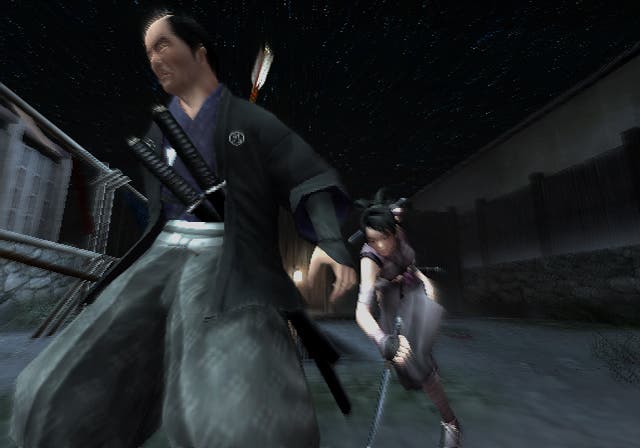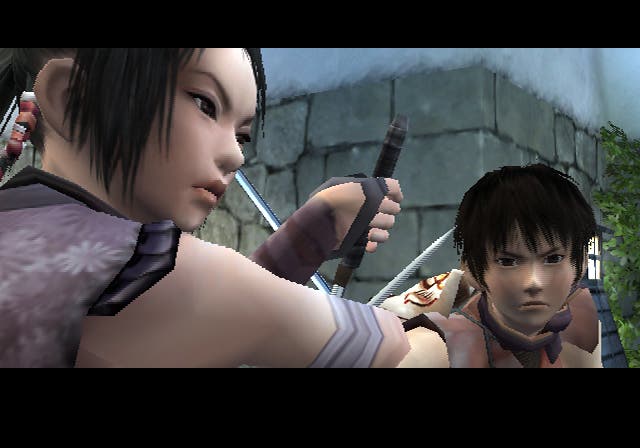Tenchu: Fatal Shadows
Hank Marvin's music claims yet more victims.
It's time for a few scientific experiments.
1) Take a teaspoon full of antacid powder, and a shot-glass full of lemonade. Put the antacid in your mouth, and then straight away pour in the lemonade. Don't drink it, and for the sake of all things holy, don't swallow at any point. Keep your mouth closed for one minute.
2) Stand with your back against a wall. Press your heels tight against it. Now, without moving your feet, bend over and touch your toes.
3) Stay with your back against the wall. This time, without the aid of a mirror, try and look at your own face.
You're not allowed to carry on reading until you've done at least numbers 2 and 3. So you should have discovered by now that they're all impossible.
Now, while we're not fully trained ninjas at Eurogamer, we have spent countless evenings leaping about our houses dressed in pyjamas with black scarves wrapped around our faces. It's safe to say we know a fair thing or two about the flip-out ways of these mammals. And as you've already discovered for yourself, when stood with your back against a wall, what you tend to be able to see is what's in front of you. In a stealth-based game, featuring kick-ass ninjas, you'd think such a view would be offered. But when in such a position in Tenchu: Fatal Shadows, all you can bloody well see is yourself.
Perhaps that was quite a lot of effort to drive home that one point, but it's a fairly helpful example of why Tenchu: Fatal Shadows, no matter how loyal some may feel to the name, is really very stupid.
Despite a new development team, this eight-thousandth release in the seventeen-year series does not see any enormous changes from past editions. And sadly we mean those on the PS1. Graphically, as well as in terms of play, this is taking nostalgia a little too far.

Instead of starring regular series hero Rikimaru, Fatal Shadows brings franchise-regular Ayame to the forefront, alongside new lady-ninja Rin; the two battling against the forces of... wait, oh we forget. The forces of something simply horrid. You alternate between the two with each mission, opposing each other at first, while Rin thinks Ayame is responsible for the burning of her village, and then together once their differences have been resolved over the slaying of a mutual enemy. Hurnnghh.
Sorry - that was the noise of our giving up bothering with the astonishingly garbled and nonsensical storytelling. It's thrown at you in two ways. Firstly between missions: over some frenetically cut cartoon stills (that are the same each and every time), a narrator (sounding like the guy who announces the wins in Soul Caliber) babbles something that at best might be beat poetry. Then, secondly, crudely constructed cut-scenes feature the two ninjas moaning and squealing in OC-a-like Californian valley-girl accents about how their friend is dead, or whatever. It's utterly impossible to care.
No matter what rubbish it was trying to make you listen to, it quickly becomes clear that once more you've got to get your character from one side of a map to the other, sneaking and stealth-killing the bads as you go. The actually-quite-fun grappling hook encourages rooftop pathways as the ideal means of travel, and for as long as you don't encounter a single enemy Tenchu offers a glimmer of hope. Zipping onto roofs, leaping and somersaulting along, landing cat-like on narrow walls - it all feels like playing a fun game. But one that is inevitably interrupted by the dozens of guards stomping about wanting to kill you. The buggers.

The aim is to be stealthy in all you do. Being spotted costs you points at the end of each section, and sneaky kills are rewarded by bonuses that build toward new skills. Which is probably why it's quite so mind-breakingly strange that both Ayame and Rin seem hell-bent on charging everywhere like elephants with inner-ear infections. Trying to keep them pressed against a wall (and hence staring straight at them, arrgnnrrr) is like trying to constrain an over-tartrazined child at the park. They're inevitably going to slip from your grip, run off screaming, and wee on the slide. Or, er, alert a guard.
And as soon as this happens, suddenly the curtain of Tenchu is pulled rudely aside, the little man pulling levers revealed. Your characters are well-equipped to thrash the crap out of these guards in face-to-face melee combat, and all the tiptoeing is entirely pointless. Worse - even this combat is unnecessary. Levels can easily be completed by turning on the overlay map and moving the red triangle toward the destination as quickly as possible. The enemies are demonstrated to pose no discernable threat, no cunning puzzles block your path, and the woeful lack of inventiveness is smeared in your face.
What else now? The camera is astonishingly poor. Certainly it's potentially quite fun to plot your way to sneak up behind a bad, and take him out with the animated uber-kill. However, the tedium required to achieve this tends to make it feel like it's not worth bothering. Not having an intelligent camera in your third-person action game is poor. But going to the effort of creating one with utterly malicious intent is plain weird. Fights more often than not take place literally off-screen, while the camera zooms in on some badly drawn ivy on a nearby fence. Swinging it to see anything is an agonizing task.
Clearly you've already done the, "In a world that contains the Splinter Cell and Metal Gear Solid series, there's no excuse for a so-called stealth game like this," so let's take that as said and understood. Instead, we'll compare with the slightly more esoteric Thief: Deadly Shadows, as neither is concerned with complicated gadgets and night-vision goggles.

Thief, while utterly brilliant, was quite a clumsy game. The hero, Garrett, did not leap nimble like a gazelle. But all the while, you felt in control. Alert a guard, and you had to quickly find darkness, hide in it, and hide in it well. Tenchu: Fatal Shadows doesn't even recognise darkness. Despite the title, and the capabilities of the PS2, lighting is irrelevant to your concealment. And despite the game's telling you that guards will ruthlessly hunt you down across entire levels, the reality is walking around a corner is enough to send them crazy with confusion, running into walls, and eventually giving you up as lost for good. Thief: DS requires that you tiptoe across hard surfaces, seeking soft grass for quieting footsteps, for fear of raising the alarm. It's after about twenty minutes of Tenchu: FS that you realise it makes no difference if you creep silently or run along, stomp your feet, bang a drum, perform a Foo Fighters medley... Just so long as you don't enter their line of sight.
Every now and then there's a glimmer, a flickering light, of hope. You'll have grappled a ledge, swung up, spotted a leap, sneaked along, rolled down, and sprung up perfectly behind a guard, brought down by one of the few stealth moves, called something like Horseradish Kickslap. And you'll feel cool. But then you'll notice that doing this has alerted two guards in distant passageways that you couldn't have seen or known about, and you'll have to choose between moving around the corner and waiting for a minute, chopping them up quickly, or ignoring them entirely and running to the level's end point. And not feel cool in the slightest.
Fans of the series... fans of the series can shut up. Having their expectations set at such a needlessly mediocre level is no reason to imply the game merits their attention more than anyone else's. With the dreadful lack of effort in the PS1-like visuals, and ghastly AI, even those with especially designed tattoos should consider their old friend exactly that: old.

